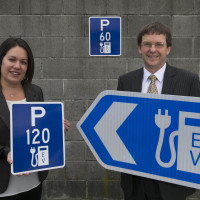Christchurch to host NZ’s first self-drive vehicle trial
Share this story
New Zealand’s first trial of a fully autonomous (self-drive) electric vehicle will take place in Christchurch next year.
HMI Technologies and Christchurch International Airport have agreed on the New Zealand based and funded trial, which is focussed on finding answers to key questions about how these vehicles could operate in this country.

The Navya is fully autonomous, has no steering wheel and is electric powered.
HMI Technologies has bought a French Navya 15-person shuttle for the trial. The vehicle is fully autonomous, has no steering wheel and is electric powered. The vehicle is expected to arrive in Christchurch before Christmas, with the trial scheduled to begin early in 2017.The trial will largely be conducted on the Christchurch Airport campus, starting on private roads with no public present, with the long-term aim of moving to public roads once the safety case has been made and all regulatory approvals are in place.
Christchurch Airport General Manager Corporate Affairs, Michael Singleton, said the airport’s interest in the trial centred on future plans for linking key areas around the airport campus.
“We hope to eventually see autonomous vehicles operating in and around the airport. Before that could happen, we want to understand the infrastructure and operating requirements for these vehicles, to understand the human/technology interface and to build the safety case for autonomous vehicles on our campus. The trial vehicle being electric also fits well with the airport’s sustainability objectives,” Mr Singleton said.
Managing Director of HMI Technologies, Mohammed Hikmet, said his company and the airport shared an interest in New Zealand being an early adopter of these vehicles.
“Both companies are keen to exploit the opportunities autonomous vehicles present New Zealand. I am proud our New Zealand company is taking a lead in initiating the first trials of this vehicle in this country. We see huge possibilities for companies like ours to develop solutions and applications for use with autonomous vehicles.”
Former Secretary for Transport Martin Matthews will be overseeing the trial, which will be designed and run with the help of researchers and developers from the University of Canterbury.
Christchurch City Council plans to use the trials to raise awareness of how autonomous vehicles and other technological developments may alter the way cities work in the future.
Deputy Mayor Vicki Buck said the trial had been months in the planning and it was great Christchurch was being used as a test-bed for new technologies.
“This trial involves a number of Christchurch organisations and is incredibly exciting and may help change the face of transport in a much shorter time frame than we currently think. I expect autonomous vehicles to be on the road here within five years and if so they will have a huge impact, in many ways,’’ Deputy Mayor Buck said.
“We are delighted to have HMI involved and delighted that the Airport has stepped up to this.’

